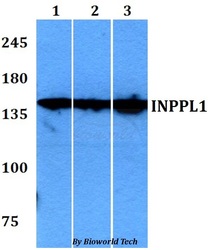Antibody data
- Antibody Data
- Antigen structure
- References [0]
- Comments [0]
- Validations
- Western blot [1]
Submit
Validation data
Reference
Comment
Report error
- Product number
- BS60810 - Provider product page

- Provider
- Bioworld Technology, Inc
- Product name
- INPPL1 polyclonal antibody
- Antibody type
- Polyclonal
- Antigen
- A synthetic peptide corresponding to residues in Human INPPL1.
- Description
- The production, survival and function of monocytes and macrophages are regulated by the macrophage colony-stimulating factor M-CSF through its tyrosine kinase receptor Fms. Binding of M-CSF to Fms induces the tyrosine phosphorylation and association of SH2-containing inositol phosphatase SHIP with the phosphotyrosine-binding domain of Shc. The SHIP protein hydrolyzes PtdIns P3 to PtdIns Ps and results in strong inhibition of cell growth. SHIP is also a target for CD28, suggesting that SHIP may be involved in the regulation of T cell activation. SHIP has several splice variants and is expressed during hematopoiesis and spermatogenesis. SHIP-2, a homolog of SHIP, is expressed in both hemopoietic and non-hemopoietic cells. In addition to T and B cells, spleen, thymus and lung are shown to coexpress SHIP and SHIP-2. SHIP is also expressed in fibroblasts, heart, skeletal muscle and different brain areas and its expression is enhanced in TSH and EGF-stimulated cells. Like SHIP, SHIP-2 is tyrosine-phosphorylated and associates with Shc after ligation of the B-cell receptor to FcgRII. SHIP-2 causes cell cycle arrest in G1 phase in glioblastoma cells and plays a negative role in regulating the PI 3-kinase-PI 3-kinase B pathway. Both SHIP and SHIP-2 mediate FcgRIIB signaling, including inhibition of proliferation.
- Reactivity
- Human, Mouse, Rat
- Host
- Rabbit
- Isotype
- IgG
- Vial size
- 100ul
- Concentration
- 1 mg/ml
- Storage
- Store at 4°C short term. Aliquot and store at -20°C long term. Avoid freeze-thaw cycles.
No comments: Submit comment
Supportive validation
- Submitted by
- Bioworld Technology, Inc (provider)
- Main image

- Experimental details
- Western blot (WB) analysis of INPPL1 pAb at 1:500 dilutionLane1:A549 whole cell lysateLane2:sp2/0 whole cell lysate Lane3:PC12 whole cell lysate
 Explore
Explore Validate
Validate Learn
Learn Western blot
Western blot